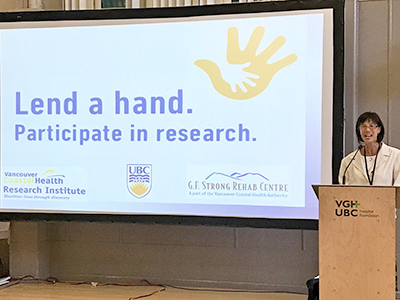
GF Strong Rehabilitation Centre recognizes the contributions of patients to rehabilitation research.
On the evening of Wednesday, September 27, researchers, trainees, coordinators and patients gathered for a special event hosted at the GF Strong Rehabilitation Centre. As the largest rehabilitation centre in British Columbia, GF Strong supports the assessment, treatment and recovery of patients with a variety of conditions such as disability after stroke, spinal cord injury, arthritis and more.
That night, faculty and research staff at GF Strong wanted to turn the spotlight around to highlight patients who have lent a hand by participating in research studies. The event celebrated research participants by recognizing their vital contributions to the leading research taking place at GF Strong. A short video featured many of the participants who were in attendance that night, including some who had participated in dozens of studies over a span of over 15 years.
GF Strong values the many different ways their former or current patients have been partners in research. This includes participating in a study or clinical trial to find the best treatment or intervention for a condition, and also contributing to study design on a focus group or working on an advisory to provide a patient-perspective. All of these roles help make the research taking place at GF Strong more meaningful, relevant, and patient-centred.
Patients support leading rehabilitation research
Dr. Janice Eng, professor and director of the Rehabilitation Research Program, hosted the event and showcased some of the research that participants had contributed to:
- Improving wheelchair training for older adults: Learning how to navigate a wheelchair can be challenging. Maneuvering around corners, doorways and curbs doesn’t come intuitively to most people—they need to learn the skills to do it safely. Dr. Bill Miller is a world leader in developing effective wheelchair training skills and his programs are used around the world. Participants in attendance had contributed to a tablet program which uses demonstrations and training games to help improve confidence in wheelchair skills.
- Scooter training helps social mobility: Dr. Ben Mortenson leads research in scooter training and education to help increase the safety of motorized mobility devices. His research helps older adults navigate their devices safely with training and education.
- Tablet system for spasticity evaluation and treatment: Dr. Patricia Mills has created a tablet-based data collection system for spasticity evaluation and treatment to help patients manage spasticity, a motor disorder that can occur in individuals with spinal cord injuries.
- Helping people with SCI maintain cardiovascular health: Dr. Andrei Krassioukov’s research focuses on improving circumstances which can lead to autonomic dysreflexia, a condition common for individuals with SCI.
- Early intervention to aid concussion recovery: Dr. Noah Silverberg investigates what kinds of early intervention can improve the chance of a good recovery after concussion.
- Stroke recovery and brain repair: Dr. Janice Eng examines optimal post-stroke exercises and other activities to aid rehabilitation after a stroke.



